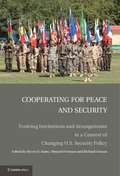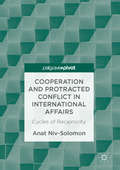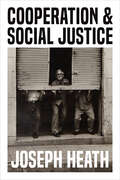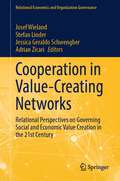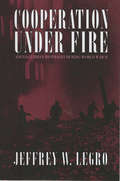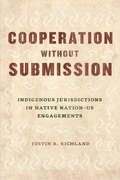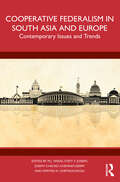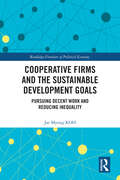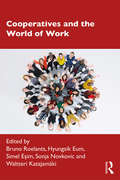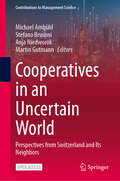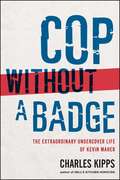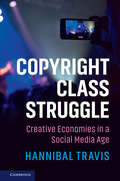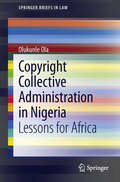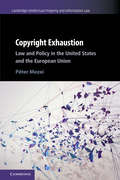- Table View
- List View
Cooperating for Peace and Security: Evolving Institutions and Arrangements in a Context of Changing U. S. Security Policy
by Bruce D. Jones Shepard Forman Richard GowanCooperating for Peace and Security is a comprehensive survey of multilateral security cooperation since 1989. With essays by leading experts on topics from peacekeeping to nuclear security, it goes beyond theoretical discussions of the value of cooperation to show how the operational activities of international organizations meet the security needs of states. In particular, it explores the complex relationship between multilateralism and American security concerns. Covering the UN, NATO, and regional organizations, the authors show that U.S. interests have often shaped institutions. But, more strikingly, other states have also driven institutional change without U.S. support or even in the face of American opposition. This raises important questions about how the balance of power shapes international institutions. In a period of shifting power dynamics, the empirical evidence on security cooperation gathered in this volume is a unique resource for scholars and policy-makers concerned with the future of international institutions.
Cooperation and Protracted Conflict in International Affairs: Cycles of Reciprocity
by Anat Niv-SolomonThis book addresses two main questions: under what conditions does reciprocity fail to produce cooperation?; and when do reciprocal dynamics lead to negative, instead of positive, cycles? Answering these questions is important for both scholars and practitioners of international negotiations and politics. The main argument of this project is that positive tit-for-tat (TFT) and negative reciprocal cycles are two possible outcomes originating from the same basic process of reciprocity. It is important to acknowledge both possibilities and understand when a situation is going to develop into one or the other outcome. The study then calls for a broader discussion of reciprocity in international relations (IR). Specifically, IR should include the negative and more problematic side of reciprocity. To exemplify this, the book provides a detailed analysis of two case studies: border and maritime disputes between China and Vietnam; and Mexico and Guatemala.
Cooperation and Social Justice
by Joseph HeathIn six new essays, philosopher and award-winning author Joseph Heath explores the connection between principles of justice and the institutional arrangements required to achieve them. Topics include the significance of status inequality, the question of open borders and immigration, the stigmatization of self-control failure, and debates over racial inequality in the United States. Ultimately, Cooperation and Social Justice reveals that one cannot think about questions of social justice without also taking seriously the institutional arrangements through which they may or may not be realized.
Cooperation in Value-Creating Networks: Relational Perspectives on Governing Social and Economic Value Creation in the 21st Century (Relational Economics and Organization Governance)
by Josef Wieland Stefan Linder Adrian Zicari Jessica Geraldo SchwengberThis volume embarks on a research journey that focuses on the processes of economic and social value creation in the 21st century. Given that value creation is increasingly organized in networks consisting of businesses, governments, academia, civil society, and other societal stakeholders, the contributions address various aspects of and challenges in governing cooperation in value-creating networks. Exploring topics such as relational rationality, cultural complexity, shared value creation, and relational contracts, this book reveals the mechanisms and processes involved in governing the complexities of inter-sectoral relationships in a networked society. Given its scope and focus, this book will appeal to scholars of economics, economic sociology, organizational studies, and related fields.
Cooperation in the Law of Transboundary Water Resources
by Christina LebClimate change, population growth and the increasing demand for water are all capable of leading to disputes over transboundary water systems. Dealing with these challenges will require the enhancing of adaptive capacity, the improving of the quality of water-resources management and a reduction in the risk of conflict between riparian states. Such changes can only be brought about through significant international cooperation. Christina Leb's analysis of the duty to cooperate and the related rights and obligations highlights the interlinkages between this duty and the principles of equitable and reasonable utilisation and the prevention of transboundary harm. In doing so, she considers the law applicable to both international watercourses and transboundary aquifers, and explores the complementarities and interaction between the rules of international water law and the related obligations of climate change and human rights law.
Cooperation under Fire: Anglo-German Restraint during World War II (Cornell Studies in Security Affairs)
by Jeffrey W. LegroWhy do nations cooperate even as they try to destroy each other? Jeffrey Legro explores this question in the context of World War II, the "total" war that in fact wasn't. During the war, combatant states attempted to sustain agreements limiting the use of three forms of combat considered barbarous—submarine attacks against civilian ships, strategic bombing of civilian targets, and chemical warfare. Looking at how these restraints worked or failed to work between such fierce enemies as Hitler's Third Reich and Churchill's Britain, Legro offers a new understanding of the dynamics of World War II and the sources of international cooperation.While traditional explanations of cooperation focus on the relations between actors, Cooperation under Fire examines what warring nations seek and why they seek it—the "preference formation" that undergirds international interaction. Scholars and statesmen debate whether it is the balance of power or the influence of international norms that most directly shapes foreign policy goals. Critically assessing both explanations, Legro argues that it was, rather, the organizational cultures of military bureaucracies—their beliefs and customs in waging war—that decided national priorities for limiting the use of force in World War II.Drawing on documents from Germany, Britain, the United States, and the former Soviet Union, Legro provides a compelling account of how military cultures molded state preferences and affected the success of cooperation. In its clear and cogent analysis, this book has significant implications for the theory and practice of international relations.
Cooperation without Submission: Indigenous Jurisdictions in Native Nation–US Engagements (Chicago Series in Law and Society)
by Justin B. RichlandA meticulous and thought-provoking look at how Tribes use language to engage in "cooperation without submission." It is well-known that there is a complicated relationship between Native American Tribes and the US government. Relations between Tribes and the federal government are dominated by the principle that the government is supposed to engage in meaningful consultations with the tribes about issues that affect them. In Cooperation without Submission, Justin B. Richland, an associate justice of the Hopi Appellate Court and ethnographer, closely examines the language employed by both Tribes and government agencies in over eighty hours of meetings between the two. Richland shows how Tribes conduct these meetings using language that demonstrates their commitment to nation-to-nation interdependency, while federal agents appear to approach these consultations with the assumption that federal law is supreme and ultimately authoritative. In other words, Native American Tribes see themselves as nations with some degree of independence, entitled to recognition of their sovereignty over Tribal lands, while the federal government acts to limit that authority. In this vital book, Richland sheds light on the ways the Tribes use their language to engage in “cooperation without submission.”
Cooperation without Submission: Indigenous Jurisdictions in Native Nation–US Engagements (Chicago Series in Law and Society)
by Justin B. RichlandA meticulous and thought-provoking look at how Tribes use language to engage in "cooperation without submission." It is well-known that there is a complicated relationship between Native American Tribes and the US government. Relations between Tribes and the federal government are dominated by the principle that the government is supposed to engage in meaningful consultations with the tribes about issues that affect them. In Cooperation without Submission, Justin B. Richland, an associate justice of the Hopi Appellate Court and ethnographer, closely examines the language employed by both Tribes and government agencies in over eighty hours of meetings between the two. Richland shows how Tribes conduct these meetings using language that demonstrates their commitment to nation-to-nation interdependency, while federal agents appear to approach these consultations with the assumption that federal law is supreme and ultimately authoritative. In other words, Native American Tribes see themselves as nations with some degree of independence, entitled to recognition of their sovereignty over Tribal lands, while the federal government acts to limit that authority. In this vital book, Richland sheds light on the ways the Tribes use their language to engage in “cooperation without submission.”
Cooperation without Submission: Indigenous Jurisdictions in Native Nation–US Engagements (Chicago Series in Law and Society)
by Justin B. RichlandA meticulous and thought-provoking look at how Tribes use language to engage in "cooperation without submission." It is well-known that there is a complicated relationship between Native American Tribes and the US government. Relations between Tribes and the federal government are dominated by the principle that the government is supposed to engage in meaningful consultations with the tribes about issues that affect them. In Cooperation without Submission, Justin B. Richland, an associate justice of the Hopi Appellate Court and ethnographer, closely examines the language employed by both Tribes and government agencies in over eighty hours of meetings between the two. Richland shows how Tribes conduct these meetings using language that demonstrates their commitment to nation-to-nation interdependency, while federal agents appear to approach these consultations with the assumption that federal law is supreme and ultimately authoritative. In other words, Native American Tribes see themselves as nations with some degree of independence, entitled to recognition of their sovereignty over Tribal lands, while the federal government acts to limit that authority. In this vital book, Richland sheds light on the ways the Tribes use their language to engage in “cooperation without submission.”
Cooperative Enterprises: Innovation, Resilience And Social Responsibility (Routledge Studies In Social Enterprise And Social Innovation Ser.)
by Piero AmmiratoCooperative Enterprises is the first textbook to examine the evolution of the cooperative enterprise model and the contribution that cooperatives can make to the economy and society.It provides an accessible overview of the subject, looking at history, cooperative models, theories, legislation, and governance. Cooperative Enterprises takes an international approach throughout, drawing on examples from cooperatives from across the globe. The book offers a valuable historical perspective, placing cooperatives within their political, social, cultural, and economic contexts since the Industrial Revolution. It analyses and compares the cooperative law of 26 jurisdictions and showcases key defining moments for cooperative enterprises, cooperative development models, cooperative‑specific good practice standards, and compares the cooperative model with the private enterprise model, giving readers a comprehensive view of the subject. The book also demonstrates that cooperatives correct the market, complement the role of the state, support local economic development, reduce income and wealth inequalities, promote social cohesion, and promote economic democracy. Students are supported with a range of pedagogical features, including case studies, tables, figures, chapter summaries, and discussion questions to encourage critical thinking.This is the ideal textbook for undergraduate and postgraduate courses on cooperative studies, and will also be an illuminating resource for students, researchers, and policymakers interested in social enterprise, business history, economic history, corporate governance, economic democracy, and community development.
Cooperative Federalism in South Asia and Europe: Contemporary Issues and Trends
by Dimitris N. Chryssochoou M. J. Vinod Stefy V. Joseph Joseph Chacko ChennatuserryThis book explores the challenges, opportunities, and trends impacting the working of federations in South Asia and Europe. It deliberates on the changing socio-economic realities, challenges facing the existing structures of governance, degrees of consociationalism, and the growing aspirations of people in South Asia and Europe. Through case studies from Greece, Germany, Austria, Switzerland, Spain, France, Sri Lanka, Pakistan, Nepal, Maldives, Bhutan, and India, the volume focuses on critical issues relating to cooperative federalism – its complexities, institutional dilemmas, and trends in South Asia and Europe. It discusses a variety of themes relevant to Cooperative Federalism including federal-state relations; cooperative governance; constitution; multiculturalism, fiscal relations, democratization, devolution of powers, consociationalism, and global citizenship in South Asia and Europe. The book further emphasizes the need to strike a balance between the federal government and the constituent units in these two regions. Topical and lucid, this book will be of interest to teachers, scholars, and researchers of political science, comparative government and politics, federalism, South Asian politics, European politics, governance studies, and political studies.
Cooperative Firms and the Sustainable Development Goals: Pursuing Decent Work and Reducing Inequality (Routledge Frontiers of Political Economy)
by Jae Myong KOHWith growing economic inequality and threats to the sustainability of human societies, Koh argues that cooperatives can play an important role in promoting decent work and reducing economic inequality in the twenty-first century and thus urges policy makers to reignite policy discussions on cooperatives. This book shows how worker cooperatives are uniquely situated to empower low- and middle-wage workers and what governments can do to promote them. Koh clarifies the mechanism by which cooperatives create an upper hand over conventional companies in ‘labor-intensive’ sectors, thereby boosting employment potential. He also explains cooperatives’ wide contribution to the Sustainable Development Goals (SDGs), including the resilience of cooperatives in times of crises and their potential to address the challenges of aging societies. Furthermore, he provides a foundational work on ‘decentralized supporting mechanisms for cooperatives’ based on the analysis of the case of South Korea, where the number of cooperatives increased by 2,000 percent between 2013 and 2023. Lastly, he explains how to use Official Development Assistance (ODA) to support cooperatives in developing countries, especially Private Sector Instruments (PSIs), which were introduced in 2016 by the Development Assistance Committee of the Organization for Economic Cooperation and Development (OECD). This book will be of interest to researchers in the fields of cooperative management, development economics, and heterodox economics, as well as to policy makers and professionals.
Cooperatives and the World of Work
by Sonja Novkovic Bruno Roelants Hyungsik Eum Simel Esim Waltteri KatajamäkiAs the world of work and jobs is more uncertain than ever because of various trends impacting it, including the rise of robotics and the gig economy, Cooperatives and the World of Work furthers the debate on the future of work, sustainable development, and the social and solidarity economy of which cooperatives are a fundamental component. Throughout the book, the authors, who are experts in their respective fields, do not limit themselves to praising the advantages of the cooperative model. Rather, they challenge the narrow understanding of cooperatives as a mere business model and raise debate on the more fundamental role that cooperatives play in responding to social changes and in changing society itself. The book is unique in tracing the historical connection between cooperatives and the world of work since the end of the First World War and the recent shifts and restructuring in enterprise and the workplace. It presents a redefinition of the very concept of work, focusing on organizational innovation. This book is published in recognition of 100 years of the International Labour Organization, and gathers together research from leading experts who were brought together at an event co-hosted by the International Co-operative Alliance (ICA) and the International Labour Organization (ILO).
Cooperatives in an Uncertain World: Perspectives from Switzerland and Its Neighbors (Contributions to Management Science)
by Stefano Brusoni Martin Gutmann Michael Ambühl Anja NiedworokThis book focuses on different aspects of cooperatives in Switzerland and its neighboring countries, and their contribution to meeting overarching societal challenges. It seeks to identify how cooperatives can tackle grand societal challenges and extends the body of research on cooperatives. The discussions are highlighted in the context of the UN’s Sustainable Development Goals. The respective chapters cover topics such as cooperatives in Switzerland (historical roots, current landscape, embeddedness in profit/nonprofit organizations, participatory governance and legal aspects), grand societal challenges and cooperatives, and the future with and of cooperatives. This is an open access book.
Coordinating Public and Private Sustainability: Green Energy Policy, International Trade Law, and Economic Mechanisms (Routledge Research in Energy Law and Regulation)
by Roy PartainThis book demonstrates the need to coordinate private and corporate actors with national and global sustainable climate policies, with conventions in the spheres of green energy laws, as well as from the spheres of commercial, trade, and other private law. While many states have joined together in the Paris Agreements in support of green energy policies, it remains a stark reality that most of the efforts to reduce greenhouse emissions remain with private actors who operate the various industries, vehicles, and vessels that emit the gases in target. The risks of anthropogenic climate change cannot be solved by environmental law alone and will need complementary support from commercial, corporate, and private law. However, aspects of commercial law, securities law, and trade law can be shown to frustrate certain aspects of green energy policies, resulting in damaging "green paradoxes". It raises issues associated with corporate social responsibility and green paradoxes, with international trade laws, and with liability risks for misrepresenting the state of feasible green energy technologies. The book will be of interest to students and scholars in the fields of energy law, environmental law, and corporate law.
Cop Without a Badge: The Extraordinary Undercover Life of Kevin Maher
by Charles KippsWhat's the difference between a cop and Kevin Maher? Kevin doesn't have a badge. And he doesn't play by the rules. Cop Without A Badge tracks confidential informant Kevin Maher as he helps the NYPD, the FBI, and many other law enforcement agencies solve cases that range from robbery to extortion to homicide. In the process, Kevin becomes the highest paid CI the DEA ever had. But Kevin's motives are more complicated than simply money. Having been arrested for Grand Theft Auto at the age of sixteen, his felony conviction prevents him from being what he always wanted to be: a police officer. So now he's out to prove to himself he truly is what he could've been. A cop. Even without a badge. Kevin Maher was 39 years old and living in New Jersey in 1996 when Cop Without A Badge was first published. Maher now works as a private investigator in the state of California.
Cop's Life: True Stories From Behind The Badge
by Randy Sutton Cassie WellsA COP'S LIFE... is about a midnight call that brings you to a grandmother battered to death in her bed while three punks go running and laughing through the night.... <P> A COP'S LIFE... is about the man in the Ninja outfit who absorbs a full magazine of hollowpoint bullets and still raises his gun to kill you...<P> A COP'S LIFE... is about the honor student, the pride and hope of his family, hanging from a speaker wire, or the baby who dies in your arms, or the people who think you're a hero--or the devil...<P> In this powerful collection of tales from the frontlines, Las Vegas police sergeant Randy Sutton goes beyond the neon into the dark corners of society, putting us into the driver's seat of his cruiser and a job that ricochets from moments of sheer terror to coffee-fueled boredom--with stops on the way at every conceivable act of human folly and depravity. With a poet's touch, and the unflinching realism of a crime scene photograph, A COP'S LIFE is the ultimate depiction of the hardest job there is.
Copy This Book!: What Data Tells Us about Copyright and the Public Good
by Paul J. HealdIn Copy This Book!, Paul J. Heald draws on a vast knowledge of copyright scholarship and a deep sense of irony to explain what's gone wrong with copyright in the twenty-first century. Distilling extensive empirical data to clearly show the implications of copyright laws and doctrine for public welfare, he illustrates his findings with lighthearted references to familiar (and obscure) works and their creators (and sometimes their creators' oddball relations). Among the questions he tackles: How does copyright deter composers from writing new songs? Why are so many famous photographs unprotected orphans, and how does Getty Images get away with licensing them? What can the use of music in movies tell us about the proper length of the copyright term? How do publishers get away with claiming rights in public domain works and extracting unmerited royalties from the public? Heald translates piles of data, complex laws, and mysterious economics, equipping readers with the tools for judging past and future copyright law.
Copycat Crime and Copycat Criminals
by Ray Surette"A comprehensive study of the nature of copycat crime, both past and present, and the forces that drive it"--Provided by publisher.
Copyfight
by Blayne HaggartWidespread file sharing has led content industries - publishers and distributors of books, music, films, and software - to view their customers as growing threats to their survival. Content providers and their allies, especially the U.S. government, have pushed for stronger global copyright policies through international treaties and domestic copyright reforms. Internet companies, individuals, and public-interest groups have pushed back, with massive street protests in Europe and online "internet blackouts" that derailed the 2012 U.S. Stop Online Piracy Act (SOPA). But can citizens or smaller countries really stand in the way of the U.S. copyright juggernaut?To answer this question, Copyfight examines the 1996 World Intellectual Property Organization internet treaties that began the current digital copyright regime. Blayne Haggart follows the WIPO treaties from negotiation to implementation from the perspective of three countries: the United States, Canada, and Mexico. Using extensive interviews with policymakers and experts in these three countries, Haggart argues that not all the power is in the hands of the U.S. government. Small countries can still set their own course on copyright legislation, while growing public interest in copyright issues means that even the United States might move away from ever-increasing copyright protection.
Copyfraud and Other Abuses of Intellectual Property Law
by Jason MazzoneIntellectual property law in the United States does not work well and it needs to be reformed-but not for the reasons given by most critics. The issue is not that intellectual property rights are too easily obtained, too broad in scope, and too long in duration. Rather, the primary problem is overreaching by publishers, producers, artists, and others who abuse intellectual property law by claiming stronger rights than the law actually gives them. From copyfraud-like phony copyright notices attached to the U. S. Constitution-to lawsuits designed to prevent people from poking fun at Barbie, from controversies over digital sampling in hip-hop to Major League Baseball's ubiquitous restriction on sharing any "accounts and descriptions of this game," overreaching claims of intellectual property rights are everywhere. Overreaching interferes with legitimate uses and reproduction of a wide variety of works, imposes enormous social and economic costs, and ultimately undermines creative endeavors. As this book reveals, the solution is not to change the scope or content of intellectual property rights, but to create mechanisms to prevent people asserting rights beyond those they legitimately possess. While there are many other books on intellectual property, this is the first to examine overreaching as a distinct problem and to show how to solve it. Jason Mazzone makes a series of timely proposals by which government, organizations, and ordinary people can stand up to creators and content providers when they seek to grab more than the law gives them.
Copyright Class Struggle: Creative Economies in a Social Media Age
by Hannibal TravisEarning an income in our time often involves ownership of or control over creative assets. Employing the law and philosophy of economics, this illuminating book explores the legal controversies that emerge when authors, singers, filmmakers, and social media barons leverage their rights into major paydays. It explores how players in the entertainment and technology sectors articulate claims to an ever-increasing amount of copyright-protected media. It then analyzes efforts to reform copyright law, in the contexts of 1) increasing the rights of creators and sellers, and 2) allocating these rights after employment and labor disputes, constitutional challenges to intellectual property law, efforts to legalize online mashups and remixes, and changes to the amount of streaming royalties paid to actors and musicians. This work should be read by anyone interested in how copyright law - and its potential reform - shapes the ownership of ideas in the social media age.
Copyright Collective Administration in Nigeria: Lessons for Africa (SpringerBriefs in Law)
by Olukunle OlaThis work explores the operation and regulation of copyright collective management in Nigeria. The nexus between creativity and copyright and how creativity has played a pivotal role in development is explained. The need to balance the interests of authors and users is discussed and the societies representing the interest of copyright owners are illustrated. Further, Nigeria's legal framework for collective management is enunciated from a pre-independence and post-independence perspective. In the course of this regulatory challenges encountered in the administration of collective management organizations, steps so far taken to address the problems, legislative reforms and judicial decisions are discussed. A path to the new regime is chartered. The South African Copyright collective management system is explored and a comparison between the Nigerian and South African system is made. Thereby the need for supervisory and regulatory agencies of government is shown to seek the national interest regarding the collective administration of copyright and related rights. Then, suggestions for improvement and lessons for Africa are provided.
Copyright Exceptions: The Digital Impact
by Robert Burrell Allison ColemanThis book was first published in 2005. Copyright 'exceptions' or 'users' rights' have become a highly controversial aspect of copyright law. Most recently, Member States of the European Union have been forced to amend their systems of exceptions so as to comply with the Information Society Directive. Taking the newly amended UK legislation as a case study, this book examines why copyright exceptions are necessary and the forces that have shaped the present legislative regime in the UK. It seeks to further our understanding of the exceptions by combining detailed doctrinal analysis with insights gained from a range of other sources. The principal argument of the book is that the UK's current system of 'permitted acts' is much too restrictive and hence is in urgent need of reform, but that paradoxically the Information Society Directive points the way towards a much more satisfactory approach.
Copyright Exhaustion: Law and Policy in the United States and the European Union (Cambridge Intellectual Property and Information Law #43)
by Péter MezeiIn this timely book, copyright scholar Péter Mezei offers a comprehensive examination of copyright exhaustion, including its historical development, theoretical framework, practical application, and policy considerations. He compares the substantive norms and case law for the first-sale doctrine in the United States and in the European Union, covering both analogue and digital applications in detail, and in doing so questions the common rejection of exhaustion in the resale of digital subject matter such as computer programs, sound recordings, audiovisual works, and e-books. Instead, he proposes a digital first-sale doctrine that would offer legal consistency to copyright law and a technologically feasible framework for content producers and consumers. This book should be read by anyone interested in how copyright law continues to evolve in conjunction with the digital world. Proposes a concise collection of policy arguments on copyright exhaustion; Collects and analyzes the historical, as well as the most recent court decisions on exhaustion from the US, EU, and several other countries; Provides a critical approach to the status quo of exhaustion and provides a workable solution for the problem of digital exhaustion.
